Contemporary Theories of Political System Content
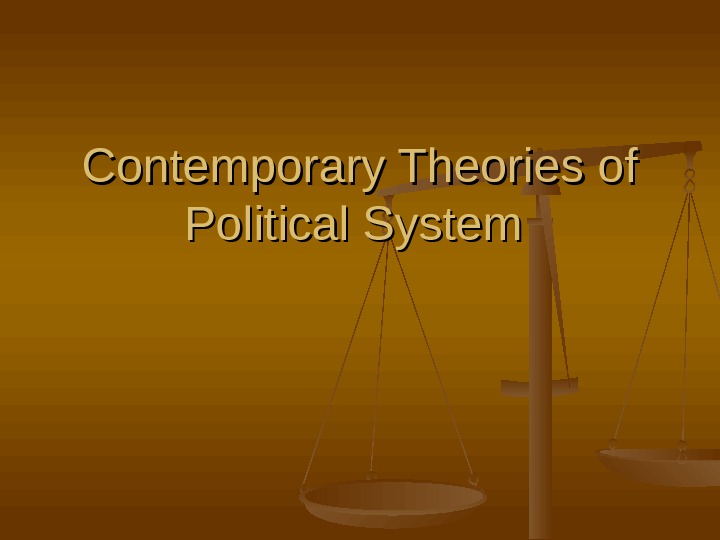


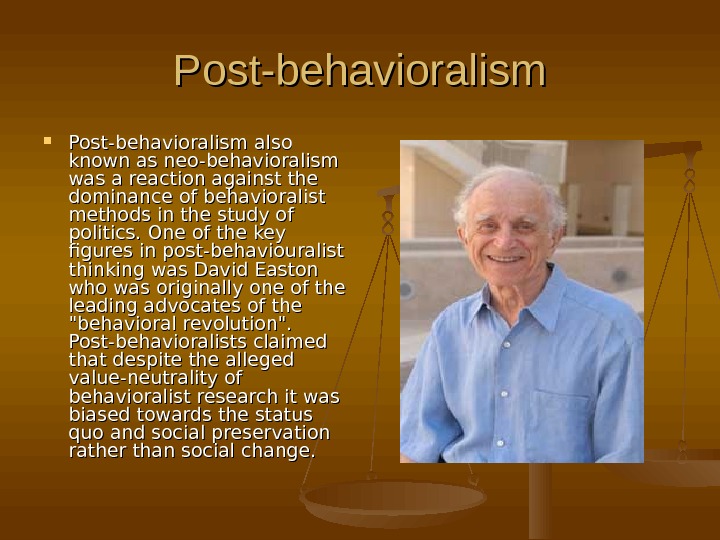

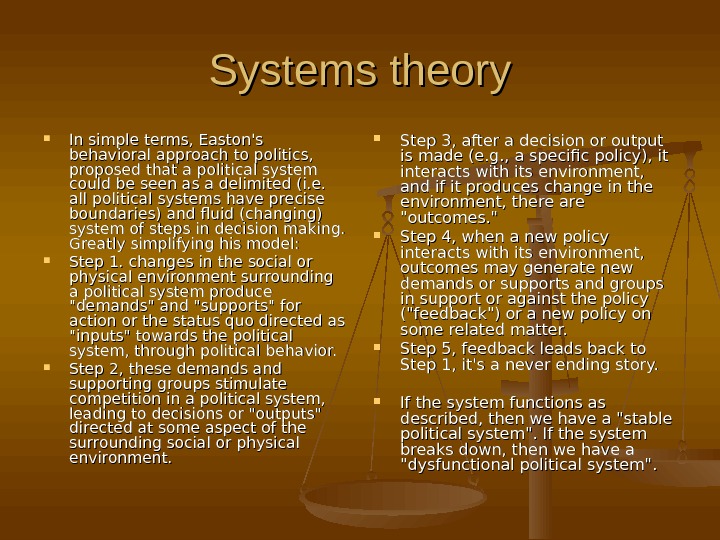
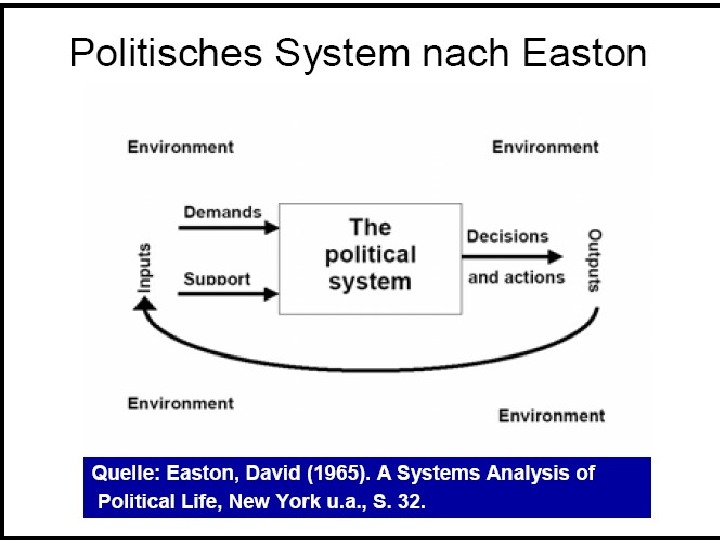
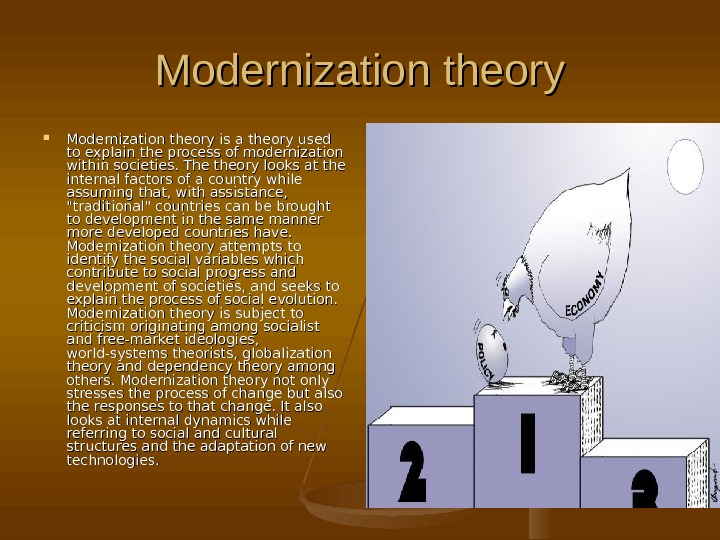
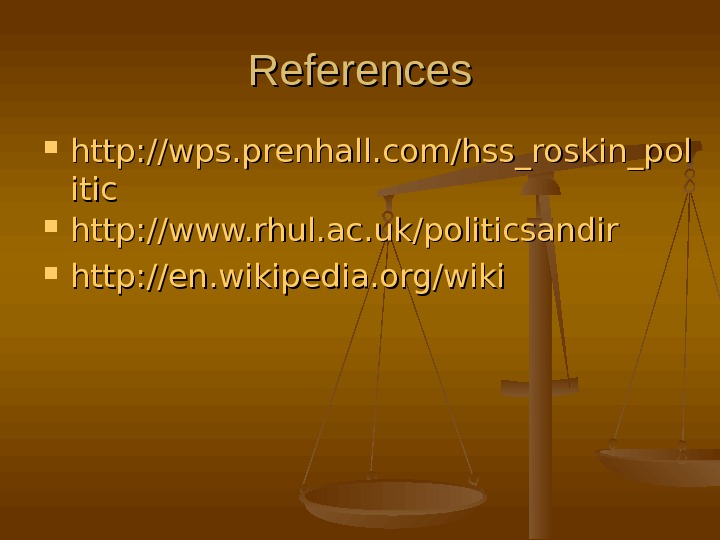

contemporary_theories_of_political_system.ppt
- Размер: 383 Кб
- Количество слайдов: 10
Описание презентации Contemporary Theories of Political System Content по слайдам
 Contemporary Theories of Political System
Contemporary Theories of Political System
 Content BB ehavioralism PP ostost — behavioralism SS ystems theor yy Modernization theory
Content BB ehavioralism PP ostost — behavioralism SS ystems theor yy Modernization theory
 BB ehavioralism Behavioralism is an approach in political science, which emerged in the 1930 s in the United States. It represents a sharp break from previous political science. This is because it emphasized an objective, quantified approach to explain and predict political behavior. It is associated with the rise of the behavioral sciences, modeled after the natural sciences. This means that behavioralism tries to explain behavior with an unbiased, neutral point of view. Behavioralism seeks to examine the behavior, actions, and acts of individuals – rather than the characteristics of institutions such as legislatures, executives, and judiciaries – and groups in different social settings and explain this behavior as it relates to the political system.
BB ehavioralism Behavioralism is an approach in political science, which emerged in the 1930 s in the United States. It represents a sharp break from previous political science. This is because it emphasized an objective, quantified approach to explain and predict political behavior. It is associated with the rise of the behavioral sciences, modeled after the natural sciences. This means that behavioralism tries to explain behavior with an unbiased, neutral point of view. Behavioralism seeks to examine the behavior, actions, and acts of individuals – rather than the characteristics of institutions such as legislatures, executives, and judiciaries – and groups in different social settings and explain this behavior as it relates to the political system.
 Post-behavioralism also known as neo-behavioralism was a reaction against the dominance of behavioralist methods in the study of politics. One of the key figures in post-behaviouralist thinking was David Easton who was originally one of the leading advocates of the «behavioral revolution». Post-behavioralists claimed that despite the alleged value-neutrality of behavioralist research it was biased towards the status quo and social preservation rather than social change.
Post-behavioralism also known as neo-behavioralism was a reaction against the dominance of behavioralist methods in the study of politics. One of the key figures in post-behaviouralist thinking was David Easton who was originally one of the leading advocates of the «behavioral revolution». Post-behavioralists claimed that despite the alleged value-neutrality of behavioralist research it was biased towards the status quo and social preservation rather than social change.
 Post-behavioralism challenged the idea that academic research had to be value neutral and argued that values should not be neglected. Post-behavioralism claimed that behavioralism’s bias towards observable and measurable phenomena meant that too much emphasis was being placed on easily studied trivial issues at the expense of more important topics. Research should be more relevant to society and intellectuals have a positive role to play in society.
Post-behavioralism challenged the idea that academic research had to be value neutral and argued that values should not be neglected. Post-behavioralism claimed that behavioralism’s bias towards observable and measurable phenomena meant that too much emphasis was being placed on easily studied trivial issues at the expense of more important topics. Research should be more relevant to society and intellectuals have a positive role to play in society.
 Systems theory In simple terms, Easton’s behavioral approach to politics, proposed that a political system could be seen as a delimited (i. e. all political systems have precise boundaries) and fluid (changing) system of steps in decision making. Greatly simplifying his model: Step 1. changes in the social or physical environment surrounding a political system produce «demands» and «supports» for action or the status quo directed as «inputs» towards the political system, through political behavior. Step 2, these demands and supporting groups stimulate competition in a political system, leading to decisions or «outputs» directed at some aspect of the surrounding social or physical environment. Step 3, after a decision or output is made (e. g. , a specific policy), it interacts with its environment, and if it produces change in the environment, there are «outcomes. » Step 4, when a new policy interacts with its environment, outcomes may generate new demands or supports and groups in support or against the policy («feedback») or a new policy on some related matter. Step 5, feedback leads back to Step 1, it’s a never ending story. If the system functions as described, then we have a «stable political system». If the system breaks down, then we have a «dysfunctional political system».
Systems theory In simple terms, Easton’s behavioral approach to politics, proposed that a political system could be seen as a delimited (i. e. all political systems have precise boundaries) and fluid (changing) system of steps in decision making. Greatly simplifying his model: Step 1. changes in the social or physical environment surrounding a political system produce «demands» and «supports» for action or the status quo directed as «inputs» towards the political system, through political behavior. Step 2, these demands and supporting groups stimulate competition in a political system, leading to decisions or «outputs» directed at some aspect of the surrounding social or physical environment. Step 3, after a decision or output is made (e. g. , a specific policy), it interacts with its environment, and if it produces change in the environment, there are «outcomes. » Step 4, when a new policy interacts with its environment, outcomes may generate new demands or supports and groups in support or against the policy («feedback») or a new policy on some related matter. Step 5, feedback leads back to Step 1, it’s a never ending story. If the system functions as described, then we have a «stable political system». If the system breaks down, then we have a «dysfunctional political system».

 Modernization theory is a theory used to explain the process of modernization within societies. The theory looks at the internal factors of a country while assuming that, with assistance, «traditional» countries can be brought to development in the same manner more developed countries have. Modernization theory attempts to identify the social variables which contribute to social progress and development of societies, and seeks to explain the process of social evolution. Modernization theory is subject to criticism originating among socialist and free-market ideologies, world-systems theorists, globalization theory and dependency theory among others. Modernization theory not only stresses the process of change but also the responses to that change. It also looks at internal dynamics while referring to social and cultural structures and the adaptation of new technologies.
Modernization theory is a theory used to explain the process of modernization within societies. The theory looks at the internal factors of a country while assuming that, with assistance, «traditional» countries can be brought to development in the same manner more developed countries have. Modernization theory attempts to identify the social variables which contribute to social progress and development of societies, and seeks to explain the process of social evolution. Modernization theory is subject to criticism originating among socialist and free-market ideologies, world-systems theorists, globalization theory and dependency theory among others. Modernization theory not only stresses the process of change but also the responses to that change. It also looks at internal dynamics while referring to social and cultural structures and the adaptation of new technologies.
 References http: //wps. prenhall. com/hss_roskin_pol itic http: //www. rhul. ac. uk/politicsandir http: //en. wikipedia. org/wiki
References http: //wps. prenhall. com/hss_roskin_pol itic http: //www. rhul. ac. uk/politicsandir http: //en. wikipedia. org/wiki
 Thank You For Your Attention
Thank You For Your Attention
